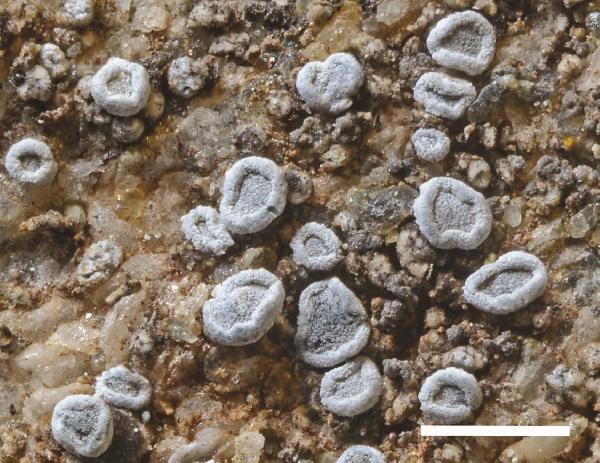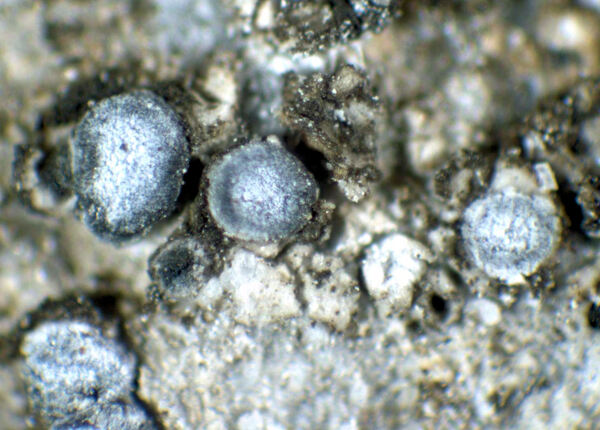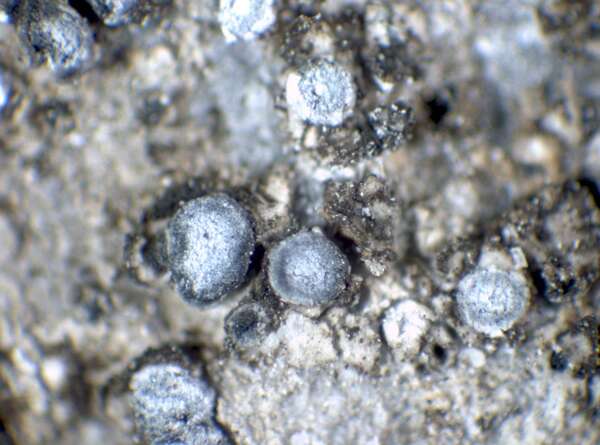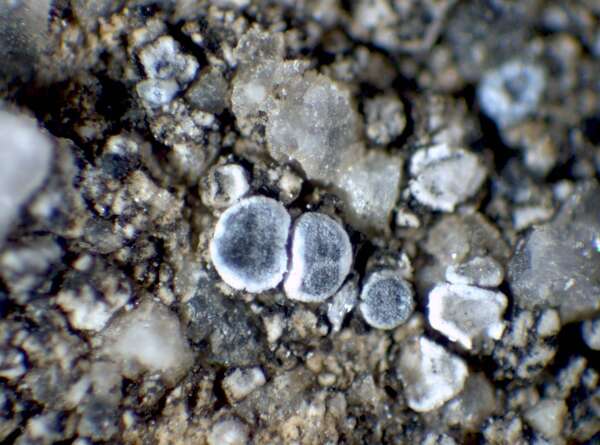Polyozosia perpruinosa Fröberg ex S.Y. Kondr., Lőkös & Farkas
in Kondratyuk & al., Acta Bot. Hung., 61, 1-2: 156, 2019. Basionym: Lecanora perpruinosa Fröberg - Calc. Lich. Öland: 51, 1989.
Synonyms: Myriolecis perpruinosa Śliwa, Zhao Xin & Lumbsch
Description: Thallus crustose, endosubstratic or thinly episubstratic, whitish to ash-grey, often inconspicuous or developed only around the apothecia. Apothecia lecanorine, usually clustered, sessile, 0.3-0.8 mm across, with a concave to flat, dark brown to black, but heavily bluish-white-pruinose (at least when young) disc and a smooth, pruinose, pale grey thalline margin. Thalline exciple corticate, 130-140 μm wide, the cortex clearly paraplectenchymatous, 15-30 μm thick, greenish and N+ purple in outer and upper parts, filled with granules (visible under polarized light) which are insoluble in K and soluble in N, the medulla rich in algae; proper exciple thin, indistinct; epithecium brown to patchily greenish black, without granules but with a thin epipsamma insoluble in K and soluble in N, the greenish parts N+ purple; hymenium colourless, 70-75 μm high; paraphyses rather thick, mostly simple, submoniliform in upper part, appearing as chains of swollen cells, the apical cells subcapitate; hypothecium colourless or very pale yellow, 70-85 μm high, without granules. Asci 8-spored, elongate-clavate, very thin-walled, with a K/I+ blue, tall tholus penetrated by a faintly amyloid apical cushion, the wall K/I-, surrounded by a K/I+ blue outer layer, Lecanora-type. Ascospores 1-celled, hyaline, broadly ellipsoid, (9-)10-14 x 5-6(-7.5) μm. Photobiont chlorococcoid. Spot tests: thallus and apothecial margin K-, C-, KC-, P-, UV-. Chemistry: without lichen substances.
Growth form: Crustose
Substrata: rocks
Photobiont: green algae other than Trentepohlia
Reproductive strategy: mainly sexual
paras (occasionally) of crustose lichens
Commonnes-rarity: (info)
Alpine belt: rather rare
Subalpine belt: rather common
Montane belt: rather rare
Dry submediterranean belt: absent
Humid submediterranean belt: absent
Padanian area: absent
pH of the substrata:
1 2 3 4 5
Solar irradiation:
1 2 3 4 5
Aridity:
1 2 3 4 5
Eutrophication:
1 2 3 4 5
Poleotolerance:
0 1 2 3
Altitudinal distribution:
1 2 3 4 5 6
Rarity
absent
extremely rare
very rare
rare
rather rare
rather common
common
very common
extremely common
Loading data...
Occurrence data
Predictive map

Source: Arup, U., Blom, H. H. & Lindblom, L. 2021. The Gaupne area in Sogn og Fjordane – a hot-spot for lichens in Norway. Graphis Scripta 33 (3): 31–49. Oslo. ISSN 2002-4495. - CC BY-4.0
Myriolecis perpruinosa. Typical apothecia with prominent margin covered by a thick white pruina.
Arup L18268 (LD). Bar = 1 mm.
Growth form: Crustose
Substrata: rocks
Photobiont: green algae other than Trentepohlia
Reproductive strategy: mainly sexual
paras (occasionally) of crustose lichens
Commonnes-rarity: (info)
Alpine belt: rather rare
Subalpine belt: rather common
Montane belt: rather rare
Dry submediterranean belt: absent
Humid submediterranean belt: absent
Padanian area: absent
pH of the substrata:
| 1 | 2 | 3 | 4 | 5 |
Solar irradiation:
| 1 | 2 | 3 | 4 | 5 |
Aridity:
| 1 | 2 | 3 | 4 | 5 |
Eutrophication:
| 1 | 2 | 3 | 4 | 5 |
Poleotolerance:
| 0 | 1 | 2 | 3 |
Altitudinal distribution:
| 1 | 2 | 3 | 4 | 5 | 6 |
Rarity
absent
extremely rare
very rare
rare
rather rare
rather common
common
very common
extremely common
Loading data...
Occurrence data
Predictive map










